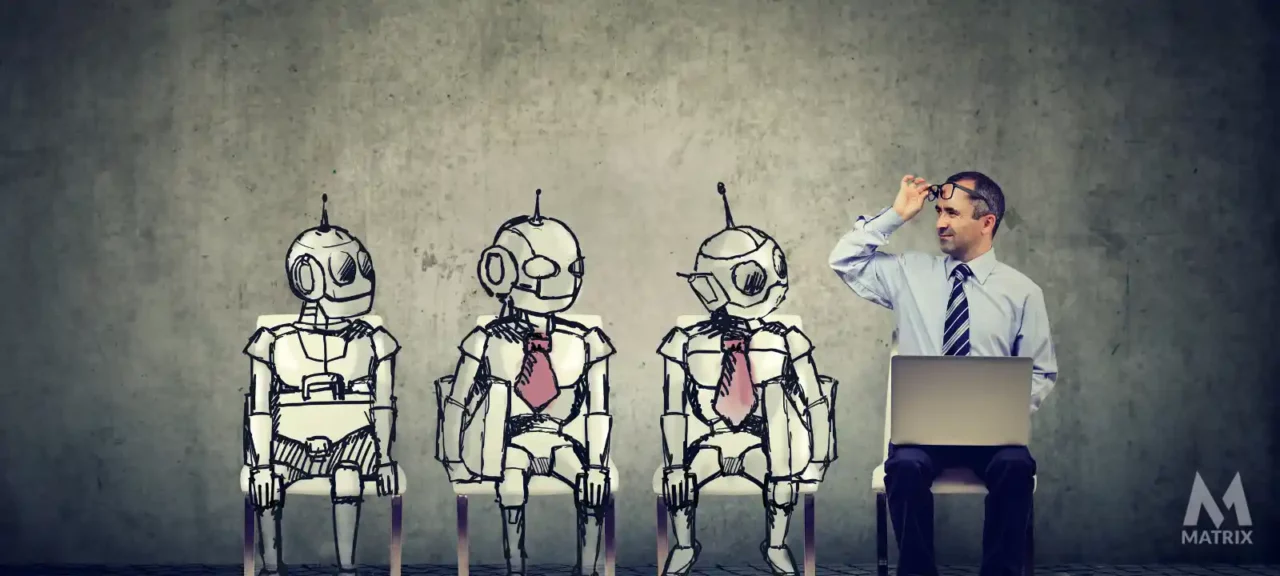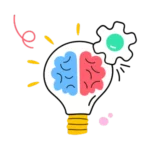Job Security ChatGPT: Is AI Going to Take My Job? Maybe!
Learn About Job Security ChatGPT: Is AI Going to Take My Job? It’s up to you!
When it comes to AI, many marketers worry that a machine will replace their jobs. After all, automation is increasing in many industries, and most professions are not immune—the same goes for marketing.
Job security, potential layoffs, and impact on an individual’s life have significant consequences. It’s not one to take lately. This subject must be handled carefully by employees and the public.
Being an entrepreneur for over 30 years and working for the big boys, IBM, Baan, and Sun Microsystems, I haven’t seen it all. But I’ve seen a lot. I recall when Gerstner took over as chairman and chief executive for John F. Akers, a 33-year IBM veteran. I was there.
We do not take this subject lightly. I had never seen people crying in the bathrooms as they got their notices, and for a good reason: they had been fourth-generation IBMers. My heart dropped for them. I never saw this, and I was still early in my career.
Then, I realized the importance of self-determination—if you don’t take control of your life, someone else will. My mother instilled in me an endless curiosity and drive to learn.
The marketing vendors tell their inbound partner agencies that it’s another tool, just like Photoshop. WTF? Are you serious? I do not want to pick on these people, but have you seen ChatGPT5?
Here’s the deal: AI is coming for your job. But it’s in your hands to get ahead of it.
These qualities have served me well, propelling me to become a professor at multiple institutions while running a successful digital marketing agency for over two decades.
Or I can recall when a little med-tech company out of Boulder, Colorado, called BTI Technologies, was bought out by a big organization called BOC out of London after I worked there for 5 years (we all knew it was coming). AI Agentic Systems for Marketing Healthcare Organizations

I had about 120 reports at the time, and I had to go through and meet with each of them and ask them if they would accept the new role under the new organization with a new job description and salary grading scales. All the stuff the big corporate organizations bring from HR has advantages and disadvantages.
I could go on and on with stories. But that’s me.
But how easily can marketers ensure job security in an ever-changing world of technology? Thankfully, ChatGPT is here to help: this powerful AI tool enables you to get a clear insight into your role’s prospects and make smarter decisions for your career growth while still being secure. What jobs has AI already replaced? But are there new chatbot jobs? Or should I find jobs that AI can’t replace, like an HVAC technician?
Intelligent AI Agentic Systems
The Next Frontier of Generative AI: Agentic Systems
These systems function as autonomous digital colleagues, able to plan, reason, and execute complex tasks with minimal human intervention. Their capabilities allow them to transform from helpful assistants into proactive decision-makers and core contributors in business environments.

The advent of AI is bringing about a profound shift in various professions, including content writing. While AI holds significant potential to automate certain writing tasks, it’s important to remember that it is a powerful tool, but a tool nonetheless.
AI does not render human input obsolete; rather, it changes the nature of the skills required.
As such, the rise of AI in content creation does not spell the end for content writers, but it does signal a need for change. Content writers must rely on more than traditional writing skills. They must embrace AI and the changes it brings or risk being outpaced by those who do.
The strengths of human writers – such as creativity, critical thinking, empathy, and the ability to understand complex societal nuances – cannot be replicated by AI.
Content writers need to up-skill, leveraging AI to automate routine tasks while focusing on enhancing their unique human skills. By sharpening these skills, content writers can continue to create compelling, emotionally resonant content that engages audiences on a level AI cannot match.
The ability to effectively use AI tools to augment content creation is fast becoming an essential skill in the content writing industry.
By learning to collaborate with AI, content writers can increase their productivity, generate new content ideas, and remain relevant in the changing landscape. Moreover, writers can broaden their skill set to include understanding and working with AI.
In conclusion, the rise of AI necessitates a shift in the role of content writers rather than eliminating it. By up-skilling and embracing AI, content writers can safeguard their role and thrive in the AI-augmented future of content creation.
Our blog post today discusses why artificial intelligence should no longer be feared but welcomed as an asset, so let’s explore together if AI can take your job! But also, what jobs will ChatGPT replace, and what jobs will AI replace? AI Blog Post Generation GPT Agent: Unleash the Future of Content Creation
I. Introduction to Job Security ChatGPT

That’s where Job Security ChatGPT comes in. This innovative platform connects job seekers with employers who prioritize job security.
Job Security ChatGPT allows job seekers to find employers who offer long-term employment and value their employees’ well-being. By leveraging this platform, job seekers can rest assured that they are taking steps toward a successful and secure career path.
A. What is AI, and how could it affect job security in the future
Artificial Intelligence, commonly called AI, is a breakthrough technology rapidly changing our job industry. In simple terms, AI is a simulation of human intelligence in machines that can learn, reason, and perform tasks that typically require human cognition.
The potential of AI is enormous, and it has the potential to revolutionize the way we work and live. While the impact of AI on job security is still being debated, some experts predict that jobs once done by humans may become obsolete due to the increasing demand and use of AI-powered systems.
With the evolution of AI, it is becoming crucial for individuals to adapt and evolve with the latest technologies to remain relevant in the future job market.
B. Importance of job security in modern society
In modern society, job security is a crucial aspect that individuals look for in their careers. With the constant changes in the economy and job market, people often worry about the stability of their current employment.
Having a sense of job security provides peace of mind and allows individuals to focus on their work without the added stress of potential unemployment. It also allows for long-term planning, such as purchasing a home or starting a family.
Moreover, job security promotes a positive work environment, encouraging workers to develop their skills and invest in the company’s success. Ensuring job security benefits employees and companies by promoting loyalty and reducing high turnover rates.
Therefore, acknowledging the importance of job security in modern society is necessary for individuals’ well-being and overall economic growth. What is Neuro-Symbolic AI for Precision Marketing?
C. Thesis statement: AI technology’s evolution poses threats and opportunities to job security.
As the development of artificial intelligence (AI) technology continues to accelerate, the effects on job security are becoming increasingly clear.
The effects of AI on the job market are complex and multifaceted and will require careful consideration as we navigate this rapidly evolving technological landscape. On the one hand, the automation of certain tasks will inevitably lead to job loss; on the other, creating new job opportunities to support the AI industry is also possible.
While there is certainly reason for concern, there is also reason for optimism as we look towards a future where AI is integrated into our lives and works responsibly and equitably.
II. The Impact of AI on the Workforce
Artificial intelligence (AI) has transformed how businesses operate and interact with customers. However, as AI continues to evolve, there is growing concern about how it will impact the workforce.
With machines becoming smart enough to read legal documents, diagnose medical conditions, and even operate vehicles, many worry that robots may soon replace their jobs. However, others argue that the rise of AI will create new job opportunities while freeing workers to focus on more challenging and fulfilling work.
Regardless of the outcome, AI is changing the world of work, and we’re only beginning to scratch the surface of its potential impact. What is an AI Content Assessment?
A. Brief history of AI in the workforce

Artificial intelligence has come a long way since its inception in the 1950s. Over the years, it has significantly contributed to the workforce, revolutionizing how we work and live.
The first AI program was created in 1951, and it took a decade of research to develop the first successful AI program. In the following years, AI gained traction and was widely used in various industries.
In the 1980s, the advent of expert systems enabled AI to mimic human decision-making processes, leading to significant advancements in fields such as medicine and finance.
Today, AI technologies are ubiquitous, providing invaluable support in various sectors, from healthcare and finance to transportation and retail. Their impact on the workforce is tremendous, and they promise to continue transforming how we work and live for years to come.
B. Statistics on job displacement due to AI
As technological advancements continue to transform the workforce, there is growing concern about AI’s impact on job displacement.
According to recent statistics, up to 30% of jobs in various industries are at risk of being automated in the next decade. This is due to AI’s growing capabilities and cost-effectiveness, which allow it to perform routine tasks faster and more efficiently than humans.
While some argue that AI has the potential to create new job opportunities, others express concern about the social and economic implications of widespread job displacement.
As we navigate this rapidly changing landscape, we must consider AI’s potential consequences on the job market and seek strategies to mitigate its impact.
C. Real-world examples of industries heavily impacted by AI (e.g., manufacturing, retail)
In recent years, the rise of artificial intelligence (AI) has significantly impacted various industries. Two industries that have been heavily impacted by AI are manufacturing and retail.
AI has transformed many manufacturing processes, such as maintenance and quality control, increasing efficiency and reducing costs.
Retail has also seen a significant shift with the introduction of AI technology, from chatbots to personalized shopping recommendations based on browsing and purchase history. As AI technology advances, it will undoubtedly have an even greater impact on these industries and many others.
D. Projections for future job displacement
As technology advances at lightning speed, the conversation around job displacement becomes more and more prevalent.
It’s estimated that by 2030, up to 800 million people worldwide could have their jobs replaced by automation. While this might sound daunting, it’s not all doom and gloom.
As we’ve seen, new technologies often create new jobs and opportunities. We must embrace change and find ways to adapt and stay competitive in the workforce. With the right education and training, we can survive and thrive in a rapidly changing job market.
III. AI and Job Creation

As technologies like artificial intelligence (AI) continue to develop, there is growing concern about the impact they may have on job opportunities.
However, while some fear these innovations will lead to massive unemployment, evidence suggests they may create new jobs in technology and data analysis. As AI becomes more prevalent in areas like healthcare, finance, and transportation, a growing number of positions are being created for engineers, programmers, and other professionals who can help design, implement, and manage these systems.
Additionally, workers are needed to help train and oversee these algorithms, ensuring that they are accurate and fair in their decision-making. Overall, while the impact of AI on the job market remains uncertain, there are reasons to remain optimistic about the potential for new career opportunities emerging in this field.
Struggling to Keep Up with Content Demands?
In today’s digital landscape, creating consistent, high-quality content is more challenging—and more important—than ever. Without a clear plan and the right tools, your brand risks falling behind in the crowded marketplace.
A. The argument for AI creating more jobs than it eliminates
Advancements in artificial intelligence have sparked concerns over job displacement. However, leading experts argue that AI may create more jobs than it eliminates.
Implementing AI technology can increase the demand for skilled workers to design, build, program, and maintain these systems. AI can also enable businesses to achieve greater efficiency and productivity, increasing profits and potential for expansion.
Moreover, using AI in certain fields can create new, previously non-existent industries. As AI continues to evolve and become more prevalent in the workforce, it’s clear that the benefits outweigh the potential risks.
B. New industries and roles created by AI (e.g., data scientists, AI ethicists)
Artificial Intelligence (AI) transforms our lives and work, creating new industries and roles previously unheard of. Among these are data scientists and AI ethicists.
Data scientists analyze vast amounts of data, using AI algorithms to identify patterns and trends that help companies make strategic decisions. On the other hand, AI ethicists ensure that machines are programmed to operate ethically and legally.
They work to establish ethical guidelines for AI algorithms so that they can make unbiased decisions free from human bias or prejudice.
The demand for these roles will only increase as AI becomes more prevalent. It’s exciting to imagine what kind of jobs technology will create in the future and how it will change our lives forever.
C. Case studies of companies that have successfully integrated AI without reducing staff

As artificial intelligence (AI) revolutionizes industries, job displacement concerns have become increasingly prevalent.
However, some companies have harnessed technology without sacrificing their human resources. For example, Retail giant Walmart has successfully integrated AI into its operations, improving efficiency without reducing staff.
Using machine learning algorithms, the company can optimize its supply chain by accurately predicting product demand, ensuring that shelves are always stocked with the right products.
Additionally, the integration of AI has allowed Walmart employees to focus less on routine tasks and more on providing quality customer service. Walmart has created a human-centric approach to innovation, exemplifying how technology and jobs coexist harmoniously. It’s a welcome reminder that successful technology adoption doesn’t have to come at the cost of human labor.
Matrix Marketing Group was introduced to the Skunkworks project, called MatrixLabX, working on implementing Matrix AI in 2011. As the technology, generative AI, progressed with text, image, and video capabilities, it became apparent to the management team that AI had a role in marketing.
The vision: To become the global leader in AI-driven digital marketing, pioneering innovative solutions that transform businesses, redefine industry standards, and profoundly impact the digital marketing landscape through emerging technologies.
So, with the rollout in 2020, we’ve had no employee turnover, and things have just started to blossom. Few people get to work in a fast-paced, exciting environment.
IV. Skills and Job Security in the AI Era

Rapid technological advancements make it no secret that the job market is also evolving. Artificial intelligence, or AI, is beginning to play a larger role in the workforce, leading to how this will impact job security.
One thing is certain: developing skills that complement AI technology may be the key to success in the future job market. Rather than fearing the potential threat of AI, individuals should embrace the opportunity to learn new skills that will make them valuable assets to businesses.
By combining human creativity and critical thinking with AI technology’s capabilities, individuals can ensure job security and remain competitive in the ever-changing job market. AI Product Management: Why Software Product Managers Need to Understand AI and Machine Learning
A. The importance of transferable skills in maintaining job security
In today’s constantly evolving job market, possessing transferable skills is becoming increasingly important. You can carry These abilities and knowledge from job to job, regardless of industry or role. Why are transferable skills so crucial for job security?
Because they enable you to adapt and grow within your career, you increase your value as an employee by developing transferable skills like communication, problem-solving, and time management.
Focusing on cultivating transferable skills equips you to handle new challenges and allows you to pivot to new opportunities, mitigating the risk of job loss or career stagnation. So, to ensure your job security, it’s essential to focus on cultivating transferable skills.
B. Skills that are and will remain in high demand in the AI era (e.g., critical thinking, creativity)
As the world of technology continues to evolve, are you ready? Ever heard of Julia, r, or maybe Chat4ALL? Learn what it is about.
Critical thinking is rapidly becoming an in-demand skill. As someone who teaches statistics, economics, marketing, and math, it’s an odd mix. In my business statistics courses for a new group of 20 students each year, I’m surprised to see just 20 to 30% grasping the subject’s essence – i.e., critical thinking.
Generative AI and text generators have brought significant advancements, impacting job security. Therefore, affected employees must upskill and reskill their talent to stay ahead in this ever-changing industry. Unfortunately, you can’t do it at the colleges or your schools, they don’t have the programs. It was very similar back when inbound and digital marketing started. Colleges lag.
With the rise of artificial intelligence, individuals who can discern patterns and make informed decisions are needed. Additionally, creativity is another essential skill in the AI era. While machines may be able to analyze data and provide solutions, humans are still needed for their unique ability to generate new ideas and innovate. As we move forward, it’s clear that individuals who possess these skills will be well-positioned to succeed in the job market and make meaningful contributions to society.
C. Education and retraining programs for workers displaced by AI

As industries continue to be disrupted by advances in artificial intelligence, there’s growing concern about the impact on the workforce.
Many workers are anxious about being replaced by machines, but education and retraining programs can help ease these worries. These initiatives provide opportunities for displaced workers to learn new skills and transition into high-tech jobs.
Investing in education and retraining ensures the workforce remains resilient despite technological change. These programs can empower workers to thrive in a digital age and contribute to a thriving economy.
V. Policy and Legislation on AI and Employment
As technology advances rapidly, policymakers and lawmakers grapple with how best to address artificial intelligence’s (AI) impact on employment.
Many fear that automation will lead to job loss and economic inequality, while others see AI as an opportunity to create new jobs and increase productivity.
Governments worldwide are working to craft policies and legislation that balance these concerns. Some have focused on retraining workers for new roles in the digital age. In contrast, others have proposed implementing a universal basic income or regulating the use of AI in certain industries.
As the debate continues, it is clear that policymakers must carefully consider AI’s implications for employment and work to create a system that benefits all members of society.
What is AGI – Artificial General Intelligence Explained – Matrix Marketing Group Symphony AI
A. Existing legislation related to AI and job displacement
Advances in AI technology continue to create new industry growth and innovation opportunities. However, these developments have also raised concerns about job displacement and the need for appropriate legislation to address related issues.
Current legislation related to AI and job displacement varies widely across different countries and often lacks comprehensive guidance on addressing the challenges posed by AI technology. To ensure a fair and sustainable future for workers in an era of rapid technological change, policymakers and industry leaders must work together to develop effective and equitable solutions that consider AI and automation’s complex ethical, social, and economic implications.
B. Proposals for future legislation
As society evolves, it’s critical for legislation to keep pace with emerging challenges and opportunities. Proposals for future legislation lay the groundwork for legal frameworks that will determine how we shape our communities and shape our lives.
Legislators must consider many factors, from environmental regulations to economic incentives, as they craft laws that will impact how we live and work.
Proposing and passing legislation can be complex, but it’s critical to ensure that our society is fair,, and sustainable. In the coming years, proposals for future legislation will play an increasingly central role in shaping our collective future.
C. Role of government and employers in ensuring job security in the AI era
The rise of artificial intelligence (AI) has significantly changed how people work. While technology has created new job opportunities, it has also led to concerns regarding job security.
The government and employers ensure job security in the AI era. Governments can create policies and regulations that protect workers from job displacement and ensure fair wages.
On the other hand, employers should provide employees with opportunities for re-skilling and up-skilling to adapt to the changing job market. The government and employers can create a more stable and secure work environment in the AI era by working together.
D. AI Corporate Governance Policy
As the AI industry continues to grow and develop rapidly, it is becoming increasingly important for companies to establish clear corporate governance policies that address the unique challenges presented by artificial intelligence.
This involves ensuring that AI systems are designed and deployed ethically and responsibly and taking steps to minimize potential risks such as bias, algorithmic discrimination, and security vulnerabilities.
By implementing effective AI governance policies, businesses can enhance the reliability and safety of their AI systems and build trust with their customers and stakeholders by demonstrating a commitment to responsible AI practices.
VI. Examples of successful Implementation of AI in various industries
Artificial intelligence has been integrated into various industries, and its successful implementation has shown impressive results.
For instance, AI-powered machines accurately diagnose diseases in the healthcare sector, saving patients and medical practitioners precious time. In banking, AI technologies have enabled fraud detection and prevention, enhancing security and reducing financial losses.
Retail giants like Amazon and Walmart use AI to recommend products, personalizing customers’ shopping experiences. The automotive industry has also adopted AI in driver assistance systems, making driving safer and more convenient.
Indeed, AI has revolutionized how we do business, enhancing efficiency, productivity, and innovation.
Examples of jobs being eliminated by AI in industries
As Artificial Intelligence continues to evolve and revolutionize various industries, it’s no surprise that certain jobs are being threatened or outright eliminated.
For example, robots and automated machines have replaced human workers in certain production areas in the manufacturing industry.
Even in the customer service field, chatbots and virtual assistants have become increasingly popular, reducing the need for call center operators. It’s not just blue-collar jobs either – algorithms and data analysis tools have made it possible for financial and accounting companies to rely less on human workers, decreasing job opportunities.
While AI certainly has its benefits, it’s important to consider its impact on the workforce and how we can prepare for these changes.
VI. Conclusion about how to handle AI job security
As the advancements in Artificial Intelligence continue to shape the future of work, concerns about job security have increasingly been raised.
However, it is important to recognize that AI technologies will not necessarily lead to job displacement but rather have the potential to enhance our workforce and increase productivity. To handle these changes in the job market, continuous learning and upskilling will be necessary to adapt to new technologies and roles.
Additionally, government policies and industry collaborations can create a system that prioritizes the retraining and well-being of workers affected by the shift toward automation.
By embracing collaboration and a “human-centric” approach, we can ensure that AI and automation are utilized to their fullest potential while enhancing job security and well-being.
A. Summary of key points about AI job upskilling
In today’s rapidly changing job market, workers seek opportunities to stay ahead of the curve and broaden their skill sets.
One area that has become increasingly important is Artificial Intelligence (AI). As more companies incorporate AI into their operations, it’s becoming clear that workers who can work with and leverage AI technology will be at a distinct advantage.
AI job upskilling focuses on expanding workers’ knowledge and abilities in data analysis, machine learning, and programming.
By learning these skills and working with AI technology, workers can position themselves for success in the future’s fast-paced, competitive job market.
B. Personal perspective on the AI job security issue
Artificial intelligence has been a topic of discussion for quite some time. One of the primary concerns people have is about the job security of various professions in the wake of the rise of AI. From my perspective, it’s important to not just focus on AI’s threats to certain jobs but also look at the opportunities it presents.
The development of AI technologies can create new job roles that are unavailable while eliminating certain repetitive tasks. Additionally, the field of AI itself requires skilled professionals to develop, design, and manage the technology.
Ultimately, I believe it is up to us to be adaptable and flexible in our approach to our professions, recognizing how they can evolve with the help of artificial intelligence.
C. Encouragement for ongoing adaptation and learning in the face of AI advancement
As artificial intelligence continues to advance rapidly and infiltrate more aspects of our daily lives, it can be easy to feel overwhelmed or intimidated.
However, rather than allowing ourselves to be defeated by these new technologies, we should focus on their opportunities for ongoing adaptation and learning. By embracing the changes brought on by AI, we can expand our skill sets, diversify our perspectives, and become even more adaptable to the constantly evolving world around us.
With a willingness to learn and a forward-thinking mindset, the potential for growth and progress in the face of AI advancement is virtually limitless.
D. Matrix Marketing rolled out generative AI in 2021 but has worked with MatrixLabX since 2011.
As technology advances at an unprecedented pace, businesses are always looking for ways to stay ahead of the competition.
One example is Robin at Matrix Marketing Group, who rolled out generative AI in 2020, marking a significant step forward for the company. However, many people don’t know that Matrix Marketing Group has collaborated with MatrixLabX since 2011 to push the boundaries of what technology can accomplish.
By utilizing the expertise of both teams, Matrix Marketing Group has been able to offer clients cutting-edge solutions that power their businesses forward. Generative AI is the latest example of the company’s commitment to innovation and growth.
Job security is an essential piece of modern life, and it is only becoming more important as AI technologies evolve. AI technology poses threats and opportunities to job security, significantly displacing certain occupations and opening new paths for work and profitability.
We have seen evidence of this in the manufacturing and retail industries, which have felt the heavy influence of such technology.
While the future impact of AI on job security is still being determined, one undeniable fact remains: AI has been revolutionizing our team since 2010, and those willing to invest in their education will be able to ride the wave of automation into a successful career. At MatrixAI, everyone is prepared for a future of automated workforce systems- consider what knowledge or skills you can develop today to be ready for tomorrow.
AIContentPad for Enterprises
AIContentPad helps reduce high customer acquisition costs (CAC) by automating content creation for SEO-optimized blogs, social media, ads, and videos. It enables marketing managers to produce high-quality, targeted content faster and at a lower cost. This efficient content strategy attracts more organic traffic and improves conversion rates, minimizing reliance on expensive paid advertising.

General FAQs
How does AI, specifically MatrixAI, affect job security?

AI, including MatrixAI, can affect job security in multiple ways. On the one hand, AI can automate certain tasks, potentially reducing the need for human labor in certain industries. However, it can also create new roles and industries that did not exist before. Ever flown a fighter jet? MatrixAI, as an advanced AI system, offers a wide range of capabilities that can automate complex tasks. However, it also creates demand for professionals who can understand, develop, implement, and manage such advanced AI systems, generating new job opportunities.
What are the measures MatrixAI is taking to minimize job displacement?

MatrixAI is committed to ethical AI deployment. This includes providing comprehensive training resources and educational programs for workers in industries where AI is being implemented. The goal is to empower these workers to adapt and thrive in the new AI-driven environment rather than being replaced. They also work closely with organizations to create a balanced human-AI workforce, where AI takes over routine tasks, leaving more complex, creative, and strategic tasks for humans.
Can MatrixAI help improve job security rather than pose a threat?

Yes, MatrixAI can improve job security by freeing human employees from repetitive and monotonous tasks. This reduces the risk of job burnout and allows workers to focus on more complex, rewarding, and irreplaceable tasks, thereby making their roles more secure. Furthermore, the growth of AI also creates a demand for new roles, such as AI specialists, data analysts, and ethical consultants, which can offer job opportunities for those willing to acquire new skills.
How can I prepare myself for the job market in the AI era with MatrixAI?

Start by educating yourself about AI and its implications. MatrixAI offers several resources and programs to help individuals understand AI better. You can also consider acquiring new skills, such as data analysis, machine learning, or AI ethics, that will likely be in high demand in the AI era. Additionally, soft skills like critical thinking, creativity, and emotional intelligence will remain invaluable in the job market, regardless of how advanced AI becomes. MatrixAI supports initiatives that foster these skill sets.

